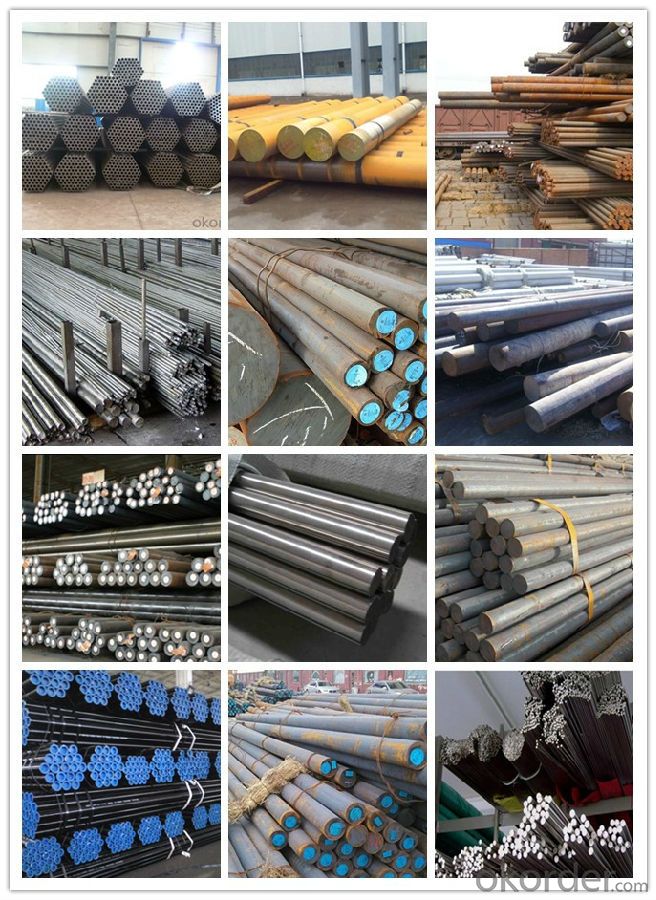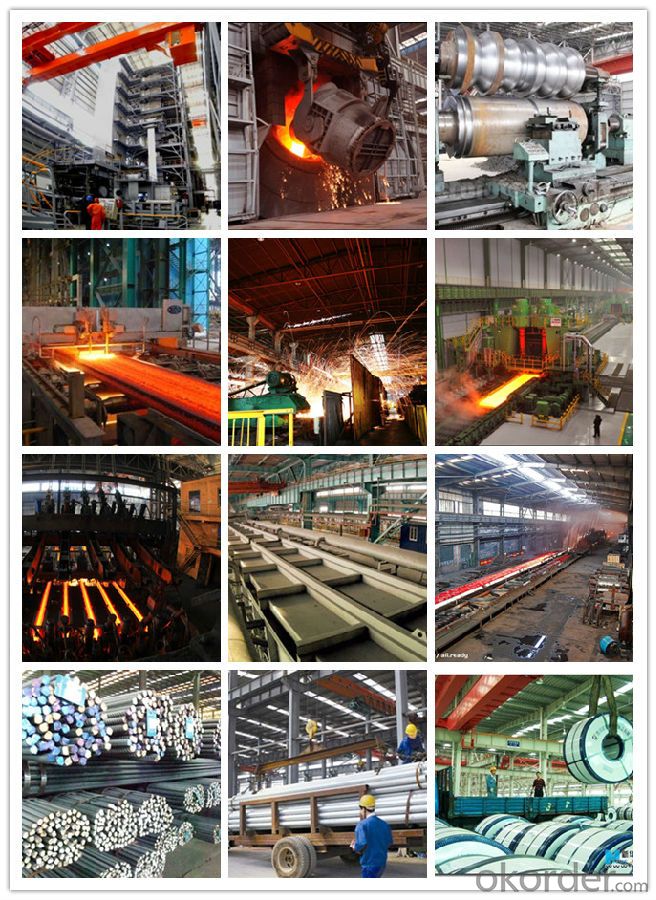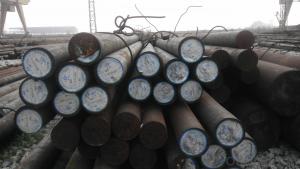Alloy Steel 6542 High Speed Tool Steel Special Steel
- Loading Port:
- China main port
- Payment Terms:
- TT OR LC
- Min Order Qty:
- 30 m.t.
- Supply Capability:
- 10000 m.t./month
OKorder Service Pledge
OKorder Financial Service
You Might Also Like
Item specifice
Chemical Composition(GB)%
| Standard | C | Si | Mn | P | S | Cr | W | Mo | V |
| W6Mo5Cr4V2 | 0.55-0.65 | ≤0.40 | ≤0.60 | ≤0.030 | ≤0.020 | 3.70-4.30 | 6.00-7.00 | 4.50-5.50 | 1.70-1.10 |
| M2 | 0.78-0.88 | 0.20-0.45 | 0.15-0.40 | ≤0.030 | ≤0.030 | 3.75-4.50 | 5.50-6.75 | 4.50-5.50 | 1.75-2.20 |
Heat Treatment
| Item | Temperature℃ | Hardness |
| Anneal | 840-860 | ≤255HB |
| Quenching | 1150-1180 | ≥60HRC |
| Tempering | 560-580 | ≥60HRC |
Applications:Used for various tools,large thermoplastic forming cutting tools,abrasion resistance components operating under high load such as cold extrusion dies
Main Product
Plastic Mould Steel
DIN 1.2311,1.2738,1.2083,1.2316 etc.
AISI P20,P20+Ni,420 etc.
JIS SUS420J2
Hot Work Steel
DIN 1.2344,1.2343,1.2367,1.2365,1.2581,1.2713 etc.
AISI H13,H11,H10,H21, etc.
JIS SKD61,SKD6,SKD5,SKT4 etc.
Cold Work Steel
DIN 1.2739, 1.2601, 1.2080, 1.2436, 1.2631, 1.263, 1.2510, 1.2327 etc.
AISI D2, D5, D3, D6, A8, A2, O1 etc.
JIS SKD10, SKD11, SKD1, SKS3 etc.
High Speed Steel
DIN 1.3343, 1.3243, 1.3247, 1.3355 etc.
AISI M2, M35, M42, T1 etc.
JIS SKH51, SKH35, SKH59, SKH2 etc.
Alloy Structural Steel
DIN 1.7035,1.6511,1.7220,1.7225 etc.
AISI 5140, 4340, 4135, 4140 etc.
JIS SCr440,SNCM439,SCM435,SCM440 etc.
Stainless & Carbon Steel or Others
DIN 1.4125,1.1191 etc
AISI 440C,1045, 1020 etc.
JIS SUS440C,S45C etc
 Product show
Product show
Workshop show

Shipping
1. FedEx/DHL/UPS/TNT for samples, Door-to-Door;
2. By Air or by Sea for batch goods, for FCL; Airport/ Port receiving;
3. Customers specifying freight forwarders or negotiable shipping methods!
Delivery Time: 3-7 days for samples; 5-25 days for batch goods.
Payment Terms
1.Payment: T/T, L/C, Western Union, MoneyGram,PayPal; 30% deposits; 70% balance before delivery.
2.MOQ: 1pcs
3.Warranty : 3 years
4.Package Informations: 1) EXPORT, In 20 feet (GW 25 ton) or 40 feet Container (GW 25 ton)
2)as customer's requirement
Why choose us?
(1) The leading exporter in China special steel industry.
(2) Large stocks for various sizes, fast delivery date.
(3) Good business relationship with China famous factories.
(4) More than 7 years steel exporting experience.
(5) Good after-sales service guarantee.
- Q:How does special steel contribute to the manufacturing of oil and gas equipment?
- Due to its unique properties and characteristics, special steel is essential in the manufacturing of oil and gas equipment. Its high strength and durability make it suitable for the demanding conditions of the industry. Equipment like drilling rigs, pipelines, and storage tanks face extreme pressures, corrosive environments, and harsh weather conditions. Special steel's superior mechanical properties allow it to withstand these conditions and ensure the equipment's reliable and long-lasting performance. Furthermore, special steel's resistance to corrosion and oxidation is highly beneficial in the oil and gas industry. Regular steel quickly deteriorates when exposed to corrosive substances and high temperatures. However, special steel is designed to resist corrosion, ensuring the equipment remains functional and safe over its lifetime. In addition, special steel's ability to withstand high temperatures and pressure differentials makes it suitable for heat exchangers and pressure vessels. These components are crucial in various oil and gas processes, including refining and transportation. Special steel's capability to handle extreme temperatures and pressures ensures the efficiency and safety of these operations. Moreover, special steel contributes to the manufacturing of oil and gas equipment by providing excellent weldability and machinability. This allows for easy fabrication and assembly, reducing production time and costs. The versatility of special steel empowers manufacturers to design and create complex equipment that meets the specific requirements of the oil and gas industry. In conclusion, special steel plays a crucial role in the manufacturing of oil and gas equipment. Its high strength, durability, corrosion resistance, and ability to withstand extreme temperatures and pressures make it an indispensable material in the industry. Special steel ensures the reliability, safety, and longevity of the equipment, making it an essential component in the oil and gas industry.
- Q:What are the main advantages of using special steel in the food processing industry?
- The main advantages of using special steel in the food processing industry are its exceptional strength and durability, resistance to corrosion and bacteria growth, and ease of cleaning and maintenance. Special steel is highly resistant to wear and tear, ensuring longevity and reducing the need for frequent replacements. Its corrosion resistance properties prevent contamination and maintain the integrity of food products. Additionally, special steel's smooth surface and non-porous nature make it easy to clean, ensuring optimal hygiene standards in food processing facilities.
- Q:What are the different techniques used for joining special steel?
- There are several techniques used for joining special steel, including welding, brazing, soldering, and adhesive bonding. Welding is the most common method, which involves melting the base material and adding a filler material to create a strong bond. Brazing uses a filler metal with a lower melting point than the base material, while soldering uses a lower melting point filler metal. Adhesive bonding involves using a special adhesive to bond the steel parts together. Each technique has its advantages and limitations, and the choice depends on the specific requirements of the application.
- Q:What are the main advantages of using special steel in the automotive industry?
- The main advantages of using special steel in the automotive industry are its high strength-to-weight ratio, improved durability and resistance to corrosion, and enhanced crashworthiness. Special steel allows for the production of lighter vehicles without compromising safety, resulting in improved fuel efficiency and reduced emissions. Additionally, its superior mechanical properties make it suitable for critical components, enhancing the overall performance and reliability of automobiles.
- Q:How does special steel contribute to the elasticity of products?
- Special steel contributes to the elasticity of products by providing a high level of tensile strength and flexibility. Its unique composition and manufacturing process allow it to withstand stress and deformation without breaking, allowing products to return to their original shape after being bent or stretched. This characteristic is crucial in various industries, such as automotive, aerospace, and construction, where the elasticity of products is essential for safety, durability, and performance.
- Q:Is special steel suitable for electrical and electronic applications?
- Yes, special steel can be suitable for electrical and electronic applications. Special steel refers to steel alloys that have been specifically designed to possess certain properties or characteristics that make them suitable for particular applications. In the case of electrical and electronic applications, special steel can offer various advantages. One of the key requirements for electrical and electronic applications is high electrical conductivity. While steel is not typically known for its electrical conductivity, certain special steel alloys can be engineered to have improved electrical conductivity. For example, stainless steel can be alloyed with elements such as nickel or copper to enhance its electrical conductivity, making it suitable for applications where electrical current needs to flow efficiently. Another important factor for electrical and electronic applications is magnetic properties. Some special steel alloys exhibit excellent magnetic properties, making them ideal for applications such as transformers, motors, and generators. These alloys can possess high magnetic permeability, low coercivity, and low hysteresis losses, which are crucial for efficient energy transfer and minimal power loss. Furthermore, special steel can also provide excellent corrosion resistance, which is essential in electrical and electronic equipment that may be exposed to moisture or harsh environments. Stainless steel, for instance, is highly resistant to corrosion, ensuring the longevity and reliability of the equipment. In summary, special steel can be suitable for electrical and electronic applications when it possesses the necessary electrical conductivity, magnetic properties, and corrosion resistance. By choosing the appropriate special steel alloy, manufacturers can ensure the performance, durability, and reliability of electrical and electronic equipment.
- Q:Can special steel be used in the production of knives and blades?
- Yes, special steel can be used in the production of knives and blades. Special steel, such as stainless steel or high carbon steel, offers excellent hardness, corrosion resistance, and edge retention properties, making it suitable for manufacturing high-quality and durable knives and blades.
- Q:What are the challenges in forming special steel?
- Several challenges arise when forming special steel due to its unique characteristics and properties. Some of the primary difficulties include: 1. The high melting point of special steels necessitates the use of specialized equipment and processes for heating and shaping the material. This can result in increased energy consumption and costs. 2. Special steels typically contain various alloyed elements to enhance their properties, such as strength, hardness, and corrosion resistance. However, controlling the alloy composition precisely can be challenging, as even minor variations can have a significant impact on the material's properties. 3. Certain special steels, such as tool steels, have a high carbon content to improve hardness and wear resistance. Unfortunately, this high carbon content makes the material more susceptible to cracking during forming processes like forging or rolling. Great care must be taken to prevent cracks and achieve the desired shape. 4. Special steels often require specific heat treatment processes, like quenching and tempering, to achieve the desired mechanical properties. These processes can be complex and require precise control of temperature, time, and cooling rates. Improper heat treatment can result in poor material performance or even structural failure. 5. Achieving the necessary surface finish and dimensional accuracy is crucial in applications where special steels are used, such as the aerospace or automotive industry. This can be challenging during forming operations, necessitating advanced tooling and precision machining techniques. 6. Forming special steels may require specialized equipment and expertise, such as high-pressure hydraulic presses, induction heating equipment, or vacuum furnaces. These specialized tools and processes add complexity and costs to the manufacturing process. Despite these challenges, forming special steels is vital in various industries that require their unique properties. Manufacturers continually invest in research and development to overcome these challenges and enhance the forming processes of special steels.
- Q:Can special steel be used in the production of springs for automotive suspension?
- Yes, special steel can be used in the production of springs for automotive suspension. Special steel, such as high-strength or alloy steel, is often preferred for its improved durability, strength, and resistance to fatigue. These properties are critical for springs in automotive suspension systems, as they need to withstand the constant stress and load of the vehicle's weight and provide a smooth ride.
- Q:How does case-hardening steel achieve high surface hardness?
- Case-hardening steel achieves high surface hardness through a process called carburizing, where the steel is heated in a carbon-rich environment. This causes carbon atoms to diffuse into the surface of the steel, creating a high concentration of carbon. The carbon atoms then form carbides, which are very hard and increase the steel's surface hardness.
1. Manufacturer Overview |
|
|---|---|
| Location | |
| Year Established | |
| Annual Output Value | |
| Main Markets | |
| Company Certifications | |
2. Manufacturer Certificates |
|
|---|---|
| a) Certification Name | |
| Range | |
| Reference | |
| Validity Period | |
3. Manufacturer Capability |
|
|---|---|
| a)Trade Capacity | |
| Nearest Port | |
| Export Percentage | |
| No.of Employees in Trade Department | |
| Language Spoken: | |
| b)Factory Information | |
| Factory Size: | |
| No. of Production Lines | |
| Contract Manufacturing | |
| Product Price Range | |
Send your message to us
Alloy Steel 6542 High Speed Tool Steel Special Steel
- Loading Port:
- China main port
- Payment Terms:
- TT OR LC
- Min Order Qty:
- 30 m.t.
- Supply Capability:
- 10000 m.t./month
OKorder Service Pledge
OKorder Financial Service
Similar products
New products
Hot products
Related keywords






























